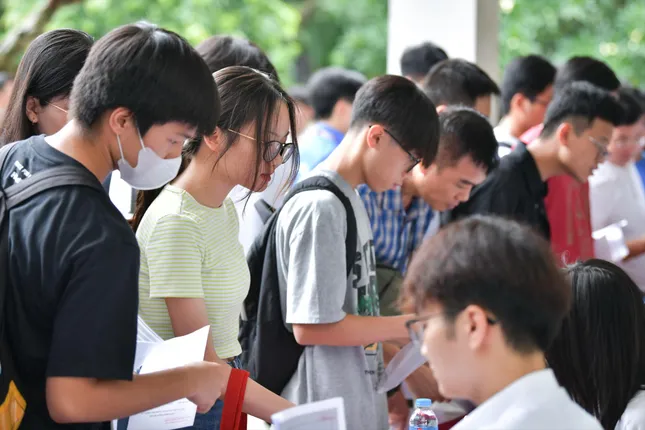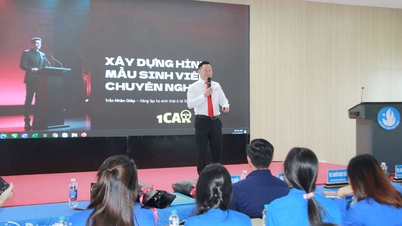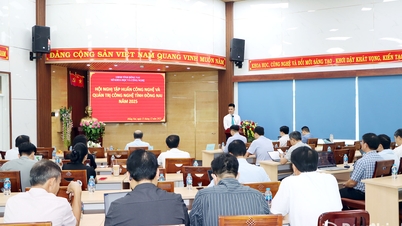Suffering because you didn't consider your budget when choosing a field of study.
The head of the training department at a major university in Hanoi said that there have been several cases of students choosing high-tuition majors during the past academic year. Upon enrollment, these students did not qualify for scholarships, and with limited family finances , they had no opportunity to apply to other universities. In response to this, the university appealed to organizations, individuals, and faculty members for assistance. However, this support is only a short-term solution; the students themselves don't know how they will manage to pay tuition fees over the next two to three years.
The leader stated that the school has assisted in finding suitable jobs at the library, helping new students earn extra living expenses. In addition, students are also looking for part-time jobs outside of school. “Financial worries will greatly impact students’ academic performance. Not graduating on time, extended study periods, and the resulting economic and time losses are immeasurable for each student,” he said.
 |
Candidates participate in the talent-based admission method of Hanoi University of Science and Technology on the morning of June 22nd. Photo: Nghiem Hue |
Tuition fees at public universities are currently increasing annually according to the government 's regulations. This year, for public universities that are not yet autonomous, tuition fees for various majors range from 1.7 million VND/month/student to 3.5 million VND/month/student, which is 190,000 VND to 390,000 VND/month higher than in 2024.
For partially autonomous universities, tuition fees are set at a maximum of twice the above tuition fee ceiling, corresponding to each field of study, ranging from 3.4 million VND to 7 million VND per month. For fully autonomous universities, tuition fees are set at a maximum of 2.5 times the tuition fee ceiling for non-autonomous universities, ranging from approximately 4.3 million VND to 8.7 million VND per month.
These are the tuition fees for the standard program (mass program). Currently, universities offer many training programs, corresponding to different tuition fees. For example, at the University of Commerce, the tuition fee for the standard program ranges from 24-27.9 million VND/year/student, while the tuition fee for the Business Administration, International Dual Degree, and Advanced programs ranges from 38.5-65 million VND/year/student. At the Vietnam Women's Academy, the tuition fee for the standard program is 14.4-16.5 million VND/year, and for the English-taught program it is 26.8 million VND/year.
Thus, within the same school, tuition fees vary between programs from 10 million VND/year to 20-30 million VND/year.
Dr. Ngo Quoc Trinh, Head of Training Department at the University of Transport Technology, believes that candidates should research tuition fees when choosing a major. Given the current complex array of tuition fees for various training programs, Dr. Trinh suggests that candidates should pay attention to the tuition fee increase schedule at autonomous universities to proactively prepare financially for their 3-4 years of university studies. At the same time, candidates should research scholarship and student loan policies at each university; compare tuition fees for the same program between different schools; and explore part-time job opportunities near the university.
According to a report by the Ministry of Education and Training, the budget allocation for higher education in 2013 was 19,271 billion VND, equivalent to 0.43% of GDP and 9.3% of the total budget allocation for education and training. By 2022, this amount had decreased to over 10,000 billion VND, accounting for 0.11% of GDP and 3.4% of the total state budget allocation for education and training.
When tuition fees become the main source of income.
Observations show that the trend towards university autonomy is strongly developing. In the near future, the number of non-autonomous public universities will decrease, and opportunities for university education with low tuition fees will become increasingly limited. Furthermore, non-autonomous universities also offer many high-quality programs and joint programs.
According to a report by the Ministry of Education and Training, the budget allocation for higher education in 2013 was 19,271 billion VND, equivalent to 0.43% of GDP and 9.3% of the total budget allocation for education and training. By 2022, this amount had decreased to over 10,000 billion VND, accounting for 0.11% of GDP and 3.4% of the total state budget allocation for education and training.
The report also states that the average ratio of spending on higher education to the total education budget in middle-income countries is 18%, and in high-income countries it is 23%. Thus, in Vietnam, the state budget allocated to higher education is very low compared to other countries in the region and the world, while the mobilization of resources from society remains limited. It can be said that after 10 years, the budget for higher education has decreased both in absolute and relative terms, while the state budget for education has remained stable at around over 20%.
Minister Nguyen Kim Son affirmed that this is a reality. The budget allocated to higher education over the past 10 years has been adjusted and changed, gradually decreasing due to the strong implementation of the trend towards university autonomy. When universities are approved for autonomy, their funding for recurrent expenditures is immediately cut. Therefore, in recent times, as the number of autonomous universities increases and the level of autonomy increases, the financial support from the State gradually decreases.
Minister Nguyen Kim Son stated that, while the total financial resources for the operation of educational institutions have increased in recent years from various sources, they remain low. Most schools rely heavily on tuition fees, leaving them with limited capacity and resources for comprehensively reinvesting in facilities and technical infrastructure. The implementation of autonomy, with its constraints on accreditation, finance, and the roadmap for pricing public service fees, has not yet fully covered training costs.
Source: https://tienphong.vn/ma-tran-hoc-phi-dai-hoc-post1753509.tpo


![[Image] Leaked images ahead of the 2025 Community Action Awards gala.](/_next/image?url=https%3A%2F%2Fvphoto.vietnam.vn%2Fthumb%2F1200x675%2Fvietnam%2Fresource%2FIMAGE%2F2025%2F12%2F16%2F1765882828720_ndo_br_thiet-ke-chua-co-ten-45-png.webp&w=3840&q=75)
![[Image] The tenacious fighting spirit of Vietnamese women's football](/_next/image?url=https%3A%2F%2Fvphoto.vietnam.vn%2Fthumb%2F1200x675%2Fvietnam%2Fresource%2FIMAGE%2F2025%2F12%2F17%2F1765990260956_ndo_br_4224760955870434771-copy-jpg.webp&w=3840&q=75)
![[Photo] Prime Minister Pham Minh Chinh receives the Governor of Tochigi Province (Japan)](/_next/image?url=https%3A%2F%2Fvphoto.vietnam.vn%2Fthumb%2F1200x675%2Fvietnam%2Fresource%2FIMAGE%2F2025%2F12%2F16%2F1765892133176_dsc-8082-6425-jpg.webp&w=3840&q=75)
![[Live] 2025 Community Action Awards Gala](/_next/image?url=https%3A%2F%2Fvphoto.vietnam.vn%2Fthumb%2F1200x675%2Fvietnam%2Fresource%2FIMAGE%2F2025%2F12%2F16%2F1765899631650_ndo_tr_z7334013144784-9f9fe10a6d63584c85aff40f2957c250-jpg.webp&w=3840&q=75)

![[Photo] Prime Minister Pham Minh Chinh receives Lao Minister of Education and Sports Thongsalith Mangnormek](/_next/image?url=https%3A%2F%2Fvphoto.vietnam.vn%2Fthumb%2F1200x675%2Fvietnam%2Fresource%2FIMAGE%2F2025%2F12%2F16%2F1765876834721_dsc-7519-jpg.webp&w=3840&q=75)









































































![[Live] Closing Ceremony and Award Presentation for the "Impressive Vietnam Tourism" Video/Clip Creation Contest 2025](https://vphoto.vietnam.vn/thumb/402x226/vietnam/resource/IMAGE/2025/12/17/1765974650260_z7273498850699-00d2fd6b0972cb39494cfa2559bf85ac-1765959338756946072104-627-0-1338-1138-crop-1765959347256801551121.jpeg)

























Comment (0)